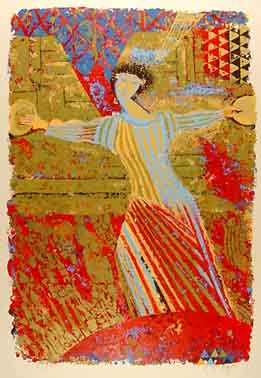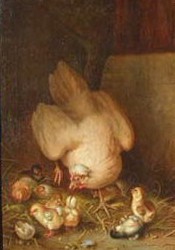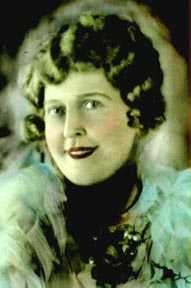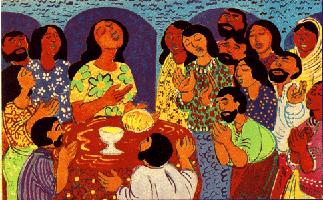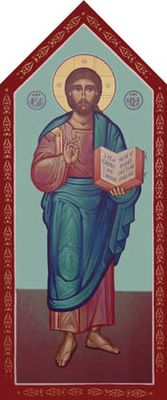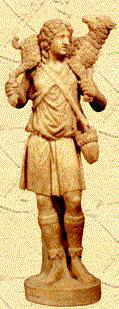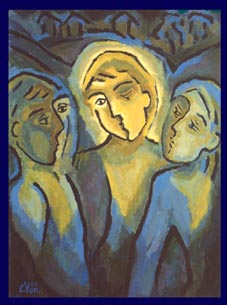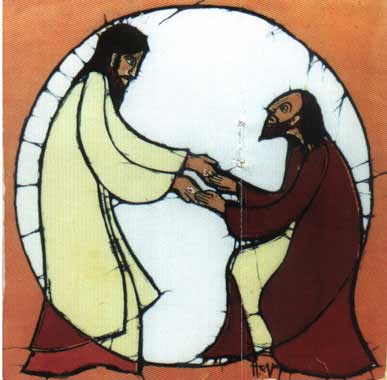This past week I suffered a bad bout of TLF -- Temporary Loss of Focus.
It all started on Beliefnet -- that mixed blessing and bane of my online life -- on the Lutheranism forum, where I got into it with an individual over The Troubles in the ELCA and the upcoming Churchwide Assembly. Frankly, I have been loathe to discuss this issue a lot, partly because it tends to throw me off my game spiritually and partly because it makes some people less willing to listen to me when I am talking about basic God stuff, which is my primary motivation for spilling my guts all over the Internet in the first place.
But -- get into it I did. And my antagonist -- one of those "This hurts me more than it hurts you, but...," kinder-gentler bigots -- said things that cut me to the quick. Now, I have been known to give as well as I get in these Internet rowdy-dows, and I responded in what I thought was a pointed, yet measured and thoughtful, way. But it just
got to me. And it got to me in, of all places, my vehicle, as I was on my way to a speaking engagement for work the next day.
I couldn't get this individual's smiley-face hatred out of my head. I imagined it multiplying exponentially. Worst of all, I imagined it metastasizing into my own congregation. I was overcome by sorrow.
I found myself crying, there in the car. And I couldn't stop. It went on for miles and miles, despite my best efforts to pull myself together. Our local public radio station's classical music host had impishly added the London Symphony's version of "You Keep Me Hanging On" to the playlist that morning, something that normally would have me laughing out loud and perhaps even singing along, but now I was sobbing to what seemed like the saddest music in the world. I finally pulled off at a gas station and just sat there for awhile until I could compose myself and repair my rapidly liquifying makeup. (This was in a community that's become regionally famous for an ongoing price war between local service stations, so perhaps the proprietors and customers thought I was weeping in relief over finding $1.87-a-gallon gasoline). Somehow, I temporarily stopped the tears from flowing, got to my engagement, mumbled something about the heartbreak of pollen season and did what I had to do. Then I got back in my car...and cried all the way home.
Help me, I prayed -- Ms. Liturgical having run out of anything else to say.
Help me.
Help was on the way. As it always is, even though I am inclined to forget that.
A couple of weeks ago a friend and I had been talking about Henri Nouwen's
Return of the Prodigal Son, a book that had come out during what I call my religious tantrum period and that I hadn't read even though I'd been a fan of Nouwen's back in my college days. (Nouwen was such a kind and good person, who modeled his Christianity so powerfully in ways that I personally find so difficult -- whenever I think of the phrase "the saints in light" I think of Henri right in their midst, interceding for all of us.) I'd special-ordered a copy, and when I got home I learned that it had arrived.
This was exactly the book I needed to read. It's a meditation on the parable of the Prodigal Son as depicted in Rembrandt's painting "The Return of the Prodigal Son," one in which Nouwen also shared, in a very intimate way, his own struggles to feel loved and accepted, and his tendency to seek these things outside the circle of God's unconditional love and acceptance. He spoke of identifying with both the younger son's sadness, shame and fatigue, there in "a far country," and with the elder son's cold resentment of his father's impartial, unconditional love. He spoke of his resistance to living into a more mature and kenotic faith -- of wanting to remain the perpetual needy adolescent instead of answering the call to serve others as the giving parent. As Nouwen journeyed into the story, I felt myself moving from role to role along with him. And something clicked.
Then...I went on retreat this weekend. There is something very energizing about being in a small group of people who are in love with God and want to do something about it. And it's not that we're always shiny, happy people holding hands. Several retreatants were having major issues with our visiting theologian, who had to spend a lot of extra time explaining the difference between "truth" and "factuality" to some highly skeptical people in various states of upset over the thought that "Moses" might be a composite character, and that the Exodus might have been less like the Cecil B. DeMille version and more like the Joads loading up the jalopy and heading to Californ-i-a; and during our breakout group time people were getting testy about everything from the Terri Schiavo saga to inclusive language. But -- we all hung in there together. And people amazed me: a very quiet, shy woman leading a really beautiful devotional she'd written herself; a discussion of Bonhoeffer's
Life Together that underlined for me my companions' longing for and commitment to that kind of in-it-for-the-long-haul faith; extemporaneous intercessory prayers that blew me away in their sincerity and eloquence. We ended celebrating the Eucharist; because of our retreat themes of Exodus and the Sacraments, our retreat pastor asperged us with a cedar bough that had been dipped into the baptismal font, so we passed through the water again, so to speak, as a reminder of God's saving acts large and small.
Bonhoeffer wrote that whenever we take our eyes off Christ, we get into trouble. I believe this. We get into trouble when we start looking for validation outside the embrace of the God who calls us beloved, who loves us constantly and without reservation. And we get into trouble when we curve in on ourselves, as Luther put it, and lose our Godward perspective. Both things wind up enslaving us; placing us under the tyranny of the world's approval and our own perpetually dissatisfied inner critic; burdening us with disappointment, with shame, with emptiness, with the weight of our own heavy hearts. I found that out the hard way this week. But help is always on the way --
always -- help that lifts us out of our sad state as self-exiled strangers and aliens, and helps us hold fast to the promise that we are beloved children in the household of God.
"Once we were slaves in the land of Egypt..." No more!
"Miriam" by Shraga Weil 
